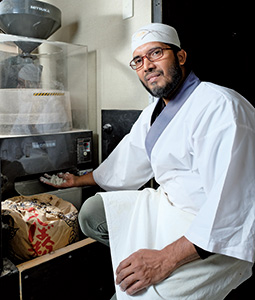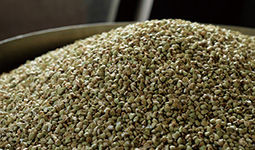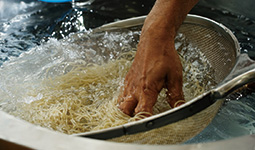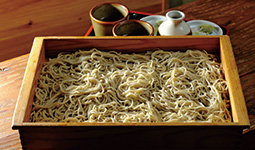Home > Highlighting JAPAN > Highlighting Japan January 2018 > My Way
Highlighting JAPAN
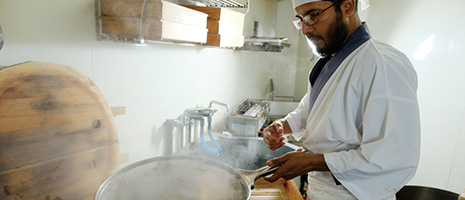
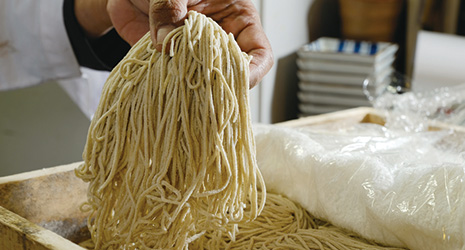
A Beloved Soba Noodle Shop in Zushi
A Bangladeshi who had a life-changing encounter with soba noodles as a student now runs a popular restaurant where he serves soba the traditional way.
In Zushi, Kanagawa Prefecture, which is close to the ancient city of Kamakura, there is a soba noodles shop loved by local residents. It is run by Mohammed Chowdhury, a Bangladeshi man. He manages the shop by himself, buying the materials, doing the preparations and making the soba.
This shop is popular because Chowdhury emphasizes the basics of delicious soba: freshly ground, freshly made and freshly boiled.
“Soba powder starts to degrade once it is ground,” Chowdhury explains. “I grind soba powder every morning; that is all I can service on the day.”
The shop has a stone mortar that Chowdhury uses to grind soba seeds into soba powder. His shop is called Ishi Usu Soba (stone mortar soba).
Soba is a traditional Japanese food. Water is added to soba powder, kneaded into dough, expanded with a rolling pin, finely cut, boiled and eaten with soup.
Chowdhury first encountered soba in 1996 when he majored in economics at a Bangladeshi university and came to Japan to study. Chowdhury’s professor often took him and other students from abroad to a soba restaurant.
Chowdhury says, “Bangladeshi cooking is delicious because it uses many ingredients with many spices. However, I was very surprised to find that soba is delicious, even though its raw materials and cooking method are very simple. I also really enjoyed the stories that my professor shared about soba and Japanese culture while eating soba.”
Since then, Chowdhury has visited libraries and read many books about soba. As Chowdhury learned more about soba, including that soba is rich in rutin, which is considered a healthy food, and that it takes a delicate technique to make, he realized that he wanted to make soba and open a restaurant of his own.
Chowdhury asked soba craftsmen to learn how to make soba, but the craftsmen declined because they were convinced that a foreigner would be unable to follow through with the tough training that is even difficult for Japanese people. But Chowdhury never gave up and was accepted by a milling company. There he learned the nature of soba powder, how to treat it and the basics of how to make it, and later received full-scale training at a soba shop introduced by the company. In 2002, he opened his much-anticipated soba shop in Zushi, choosing the location previously because the sea and mountains were nearby and the landscape was somewhat similar to his hometown.
In the beginning, some customers were dubious and ran along when they learned that a foreigner had made the soba. But once they tried it, they became regulars at his shop, which led to the shop’s reputation for serving delicious soba.
Chowdhury had gained confidence and fully entrusted a friend with the management of the shop in Zushi after three years and opened a second shop in Yokohama. But regular customers in Zushi soon complained that the taste had changed, which spurred Chowdhury to close the shop in Yokohama in 2011 and reopen a shop in Zushi.
Chowdhury says, “I learned that even if people made soba the same way, its taste would change as a result of the people who made it. Moreover, my physical condition is also reflected in the taste of the soba. Therefore, I make it a rule to stay healthy both physically and mentally every day.”
Chowdhury starts to grind the soba seeds at six o’clock every morning, measures the temperature and humidity, fine-tunes the water that will be added to the powder and makes the soba. It takes two days to make the broth for soba soup by boiling kelp, shiitake mushrooms and three types of dried bonito. Because he works so hard, he can only serve forty dishes a day and the soba is sold out as early as three o’clock in the afternoon.
Chowdhury says, “I cannot degrade the quality of soba for the regulars who have come to my shop for many years. People in Zushi are kind and warm-hearted. When I reopened my shop in Zushi and renovated it, the regulars helped me.”
Chowdhury’s soba has matured alongside the locals of Zushi who recognize and support it. Chowdhury continues to pursue delicious soba and will turn his millstone again today.
© 2009 Cabinet Office, Government of Japan
